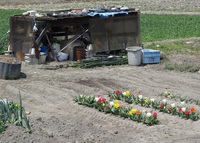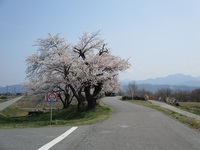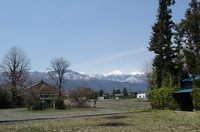VW high up! 試乗レポート(8)
up!の安全性能に関して書いておく。
1、シティエマージェンシーブレーキ
この車はhigh up!と言ってup!の中では上級車種なのだが、
up!全車種に「シティエマージェンシーブレーキ」なるものが
標準で装備されている。
これはフロントガラス上部に設置された赤外線センサーに
より、前方の障害物を検知し自動でブレーキをかけるもので、
時速30km/h未満の速度で作動する。
30km/h未満と言うのがちょっと気になる所では有るが、追突
事故は渋滞の前後で特に起こりやすいと言うのでこれを避ける
為にはかなり効果が有ると思われる。
2、ESP
これはかなり複雑なシステムで、車が横滑りを起こした時に、
ブレーキやエンジン出力を制御して、車の制御を立て直す。
なんと驚くなかれ、このESPを装備した車は単独衝突事故が
40%近く減少するという。
日本車への投入はヨーロパ車よりかなり遅れていたが、
現在はESPが搭載された車が増えている。
3、サイドエアーバッグ
運転席と助手席にサイドエアーバッグが表銃装備されている。
その昔デュッセルドルフ空港からの帰りのアウトバーンで、
夜で細かい雪が降る中、追い越し車が怖くて、思わず右に
寄りすぎて塩カルの撒いてない部分を踏んだ時、車が横滑り
しだした。
車は制御不能で、どんどん左に流れて追い越し車線に入り、
中央分離帯に近付いた。
「ああ!これはもう終わりだ」と思った時に何とかハンドル操作が
出来る様になった。
滑り始めてから操舵可能となるまでの時間が永遠に思えた。
ESPの装備はドイツから始まったが、その理由はわかる気がする。
2016年03月16日 Posted byigoten at 09:07 │Comments(8) │その他
この記事へのコメント
City Emergency Braking systemは、衝突被害軽減ブレーキのことだが、
Cityとはspeeds under 18mph、「市街」30㎞未満走行のことだろうか。
つまり公道を5,60㎞や高速道100㎞の走行は、対象外なのだろう。
なおこのCEBというネーミングは、VW社での呼び方のようだ。
横滑り防止装置は、通常ESC(Electronic Stability Control)が略称である。
VW社の略称では、ESP(Electronic Stabilization Program) と呼ぶ。
上信越自動車道の更埴JCTと小諸の間で、横風に煽られ怖かった。
こんな時も同機能搭載ならば、安全安心の安定運転ができるだろう。
Cityとはspeeds under 18mph、「市街」30㎞未満走行のことだろうか。
つまり公道を5,60㎞や高速道100㎞の走行は、対象外なのだろう。
なおこのCEBというネーミングは、VW社での呼び方のようだ。
横滑り防止装置は、通常ESC(Electronic Stability Control)が略称である。
VW社の略称では、ESP(Electronic Stabilization Program) と呼ぶ。
上信越自動車道の更埴JCTと小諸の間で、横風に煽られ怖かった。
こんな時も同機能搭載ならば、安全安心の安定運転ができるだろう。
Posted by 徒然man at 2016年03月17日 07:48
徒然man さん
関係のない話ですが、私はcityとtownの違いが判りません。
30km未満と言うのが少し引っかかります。
早いスピードの方が衝撃は大きいわけで、60km位まで
働いて欲しいと思うのですが...
横風は怖いですね、ESPは横風にも有効なんでしょうか、
なんか難しい気もしますが。
関係のない話ですが、私はcityとtownの違いが判りません。
30km未満と言うのが少し引っかかります。
早いスピードの方が衝撃は大きいわけで、60km位まで
働いて欲しいと思うのですが...
横風は怖いですね、ESPは横風にも有効なんでしょうか、
なんか難しい気もしますが。
Posted by igoten at 2016年03月17日 20:46
at 2016年03月17日 20:46
 at 2016年03月17日 20:46
at 2016年03月17日 20:46WEBSTER氏によると、cityとtownの相違は以下の通りです。
cityの語源はラテン語、townの語源はアングロ・サクソン語に由来。
cityは市民の団体を意味し、英語のように市民の住む場所ではない。
townは閉鎖的な家屋の集合体を指し、ドイツ語のzaun垣根と同根。
英国ではcityは王室特許状をもち、townは定期市のあるvillage。
cityの商業中心街について、I’m going into town. などとも言い、
会話などでは、New York’s an exciting town. と言った表現もする。
cityの語源はラテン語、townの語源はアングロ・サクソン語に由来。
cityは市民の団体を意味し、英語のように市民の住む場所ではない。
townは閉鎖的な家屋の集合体を指し、ドイツ語のzaun垣根と同根。
英国ではcityは王室特許状をもち、townは定期市のあるvillage。
cityの商業中心街について、I’m going into town. などとも言い、
会話などでは、New York’s an exciting town. と言った表現もする。
Posted by 徒然man at 2016年03月18日 17:30
徒然man さん
ありがとうございます、よくわかりましたと言うか、
なんだか余計分からなくなりました。(笑
「閉鎖的な家屋の集合体...」初めて聞く言葉です。
「英国ではcityは王室特許状をもち」
cityは王室の免状がいる...
「townは定期市のあるvillage」
townはvillageの一種。
city ---townより大きな都市。
town ---cityより小さな都市。
「英国では city の資格があってもよく town という」
cityには資格がいるのか...
何が何だか...
ありがとうございます、よくわかりましたと言うか、
なんだか余計分からなくなりました。(笑
「閉鎖的な家屋の集合体...」初めて聞く言葉です。
「英国ではcityは王室特許状をもち」
cityは王室の免状がいる...
「townは定期市のあるvillage」
townはvillageの一種。
city ---townより大きな都市。
town ---cityより小さな都市。
「英国では city の資格があってもよく town という」
cityには資格がいるのか...
何が何だか...
Posted by igoten at 2016年03月18日 20:35
at 2016年03月18日 20:35
 at 2016年03月18日 20:35
at 2016年03月18日 20:35WEBSTER氏の原文を表示します。なお、閉鎖的はenclosed spaceですので、囲いの中の場所の意味です。学力不足をご容赦ください。
city, [L. civitas (<civis, citizen), orig., citizenship, community of citizens, hence one of the Gauish states, chief twon in such a states],
1. a large, important town.
2. in the United States, an incorporated municipality whose boundaries and powers of self-government are defined by a charter from the State in which it is located: abbreviated c.
3. in Canada, a municipality of the highest rank.
4. in Great Britain, a borough or town with a royal charter, usually a town that has been or is an episcopal see.
5. all the people of a city.
6. in ancient Greece, a city-state.
town, [ME. tun, toun; AS. tun, enclosed space, group of houses, villege, town; akin to G. zaun, fence, hedge]
1. [Dial.], a group of houses; hamlet; village.
2. a more or less concentrated group of houses and private and public buildings, larger than a village but smaller than a city;
a) in most of the United States, a township
b) in New England, a rural or urban unit of local government smaller than a city, a political subdivision of a State, having its sovereighty vested in a town meeting.
3. in England,
a) a village that holds a market periodically.
b) a large, thickly populated place, as a borough, city, etc.
4. the business center of a city; as, I’m going into town.
5. the town or city being spoken of or understood: as they just got into town.
6. the inhabitants, voters, etc, of a town.
7. [Colloq.], any populated place spoken of familiarly: as, New York’s an exciting town.
city, [L. civitas (<civis, citizen), orig., citizenship, community of citizens, hence one of the Gauish states, chief twon in such a states],
1. a large, important town.
2. in the United States, an incorporated municipality whose boundaries and powers of self-government are defined by a charter from the State in which it is located: abbreviated c.
3. in Canada, a municipality of the highest rank.
4. in Great Britain, a borough or town with a royal charter, usually a town that has been or is an episcopal see.
5. all the people of a city.
6. in ancient Greece, a city-state.
town, [ME. tun, toun; AS. tun, enclosed space, group of houses, villege, town; akin to G. zaun, fence, hedge]
1. [Dial.], a group of houses; hamlet; village.
2. a more or less concentrated group of houses and private and public buildings, larger than a village but smaller than a city;
a) in most of the United States, a township
b) in New England, a rural or urban unit of local government smaller than a city, a political subdivision of a State, having its sovereighty vested in a town meeting.
3. in England,
a) a village that holds a market periodically.
b) a large, thickly populated place, as a borough, city, etc.
4. the business center of a city; as, I’m going into town.
5. the town or city being spoken of or understood: as they just got into town.
6. the inhabitants, voters, etc, of a town.
7. [Colloq.], any populated place spoken of familiarly: as, New York’s an exciting town.
Posted by 徒然man at 2016年03月19日 06:34
徒然man さん
cityは「a large, important town.」
townは「a group of houses」
cityはtownに比べより政治的意味合いを持つ。
townは生活に密着した場所。
でしょうか。
cityは「a large, important town.」
townは「a group of houses」
cityはtownに比べより政治的意味合いを持つ。
townは生活に密着した場所。
でしょうか。
Posted by igoten at 2016年03月19日 09:33
at 2016年03月19日 09:33
 at 2016年03月19日 09:33
at 2016年03月19日 09:33愚考するに、集合をローマ人はcivis市民の集まりcivitas CITYと観念し、
アングロ・サクソンは、囲まれた区域の家々の集まりをTOWNと表現した。
つまり前者のCITYとは人間の、後者のTOWNとは家々のグループである。
ところがローマの支配下に入り、ASは自分たちの田舎町はTOWNとよび、
ローマ人の造った都市をCITYと称し、TOWNより上位に置いたのだろう。
のちCITYは国王の直轄地となり、特許状を授与され繁栄することになる。
アングロ・サクソンは、囲まれた区域の家々の集まりをTOWNと表現した。
つまり前者のCITYとは人間の、後者のTOWNとは家々のグループである。
ところがローマの支配下に入り、ASは自分たちの田舎町はTOWNとよび、
ローマ人の造った都市をCITYと称し、TOWNより上位に置いたのだろう。
のちCITYは国王の直轄地となり、特許状を授与され繁栄することになる。
Posted by 徒然man at 2016年03月20日 21:11
徒然man さん
なるほど、何となくCityとTownの違いが分かってきた
気がします。
なるほど、何となくCityとTownの違いが分かってきた
気がします。
Posted by igoten at 2016年03月21日 09:45
at 2016年03月21日 09:45
 at 2016年03月21日 09:45
at 2016年03月21日 09:45











